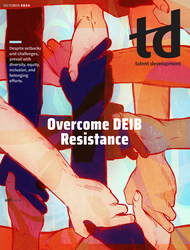TD Magazine Article
Heed the Warning Call
A review of The Canary Code by Ludmila N. Praslova.
Tue Oct 01 2024
The Canary Code
By Ludmila N. Praslova
Berrett-Koehler, 352 pp., $29.95
The term canary code refers to the little yellow birds’ role in coal mines, alerting miners to imminent danger. Praslova writes that people who identify as neurodivergent or neurominorities (such as those with autism, attention deficit hyperactivity disorder, dyslexia, dyspraxia, or dyscalculia) are the canaries of modern workplaces because they are often exceptionally attuned to the negative impacts of toxic work cultures; unproductive, dated practices; and organizational inconsistencies and inequities. However, that awareness can come with a heavy price.
Modern employment practices keep 30 percent to 85 percent of neurominorities either unemployed or underemployed, the author notes. Once employed, the price of “speaking out” or not “fitting in” may lead to companies passing over such groups for promotions in addition to bullying, ignoring, underestimating, and barring them from using talents that could elevate organizations and society.
The Canary Code captivatingly and cogently builds the case that everyone benefits when workplaces create environments where neurodivergent people feel heard and included and can thrive and succeed.
If you are new to the neurodivergence conversation, the book’s introductory section and appendices help untangle language, myths, and perspectives. Praslova also introduces six key principles businesses can adopt to build a more authentically inclusive environment: participation, outcomes focus, flexibility, organizational justice, transparency, and valid measurement. The author expands on each principle throughout the book to underpin practical implementation ideas, such as new ways of ensuring transparent hiring and onboarding practices; building valid, outcome-based performance management systems; designing trauma-informed, accessible training experiences; and actively developing neurodivergent leaders.
The “Points of Practice” and “Employer Excellence” sections provide compelling global case studies that highlight widely recognized organizations, their inclusion practices, and results. The text also addresses potential pushback and implementation challenges, such as concerns about fairness, perceived costliness of accommodations, and how to make an industrial environment more supportive of neurodivergent employees.
While content-dense, the book’s structure is easy to navigate and accommodates different ways of reading and processing. Specifically, each chapter takes the form of chunked subsections that help readers determine how deep they want to go and whether they want to focus on practice, research, human stories (including the author’s), discussion questions, or key takeaways.
The Canary Code is a valuable guide for book clubs, training departments, strategic planning sessions, and communities of practice. I highly recommend this groundbreaking book to leaders, managers, and L&D and HR professionals as they strive to heed, respond to, include, and learn from “canaries.”

